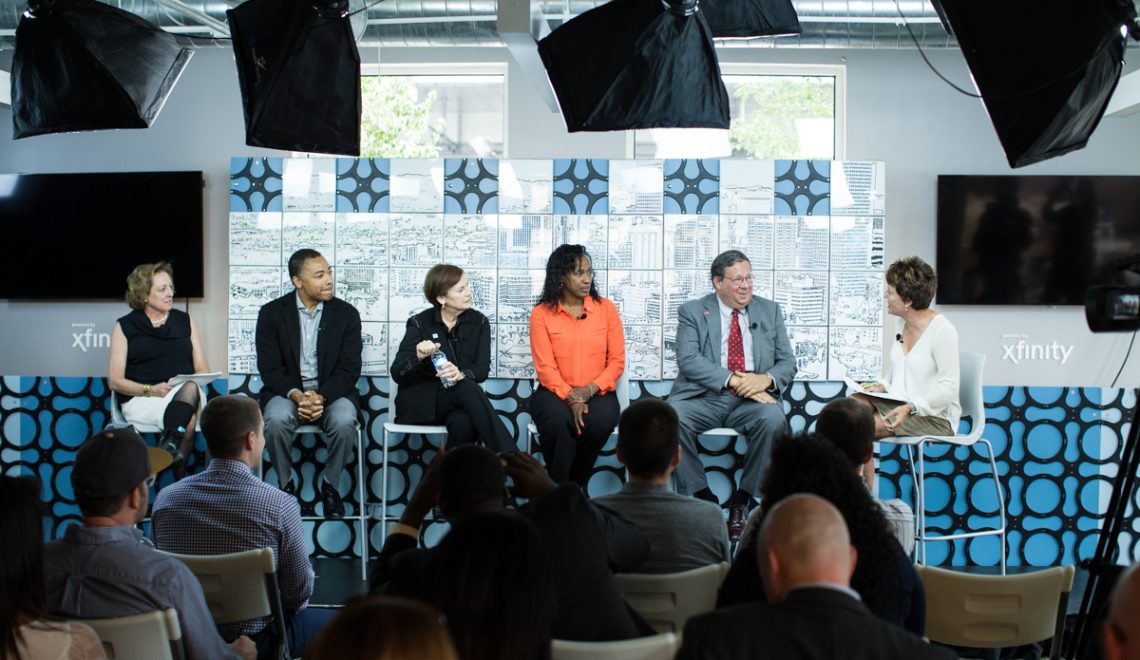
A costume dance party at Denver’s Fort Greene Bar brought to an end one of the best weeks of the year: Denver Startup Week.
For five days, from sunup to sundown, entrepreneurs, innovators, and thought leaders came together to spur one another on toward better Denver businesses. 200 free events – ranging from seminars to panels to networking meetups – cover everything from smart device technology to company culture.
But enough about the whole thing, you can find out more about all it has to offer here. I want to talk about a particular session that went beyond profit margins to spread innovative ideas bringing solutions to a pressing issue at the forefront of America’s economic future.
Get Linked Panel Sets the Stage for 21st Century Jobs and Education
The Get Linked panel, hosted by the Commons on Champa, a year-around educational hub for Denver entrepreneurs, featured the following five leaders:
- David L. Cohen, Senior Executive Vice President and Chief Diversity Officer – Comcast Corporation
- Jackie Joyner – Kersee, Six Time Olympic Medal Winner and National Spokeswoman- Internet Essentials
- Nancy J. McCallin, Ph.D., President Colorado Community College System
- Zoë Baird, CEO and President of the Markle Foundation
- Paul Washington, Executive Director Denver Office of Economic Development
Kelly Brough, Denver Metro Chamber of Commerce CEO, facilitated the discussion and started by celebrating a list of our home’s socio-economic accomplishments.
- Colorado has the second most educated workforce in the nation.
- 50% of our adults have a two-year degree or better.
- Denver is attracting highly educated millennials at a fantastic rate and it’s feeding our economy.
But then she hit us with another reality.
In four years, with the advancement of technology, 74% of our jobs will require a post-secondary completion – a certificate, apprenticeship program, two-year degree, four-year degree or more.
“We’re nowhere near those numbers,” Brough said.
David L. Cohen, Senior Executive Vice President and Chief Diversity Officer of Comcast, introduced the room to the heart of it.
“One of the fundamental problems we have in urban America today is the mismatch between the talent pool that is available and the jobs that are available… One of the central elements of that mismatch is digital skills.”
What’s the starting point for combating that mismatch? For Cohen and Jackie Joyner-Kersee, it’s bridging the digital divide.
Panel Unafraid to Talk Tough on The Digital Divide
“Low-income broadband adoption is about economic development, fundamental fairness, and equity. Making sure that we have a workforce that is ready for 21st-century jobs with 21st-century skills,” Cohen said.
In the suburban classes of America, around 90% of homes have internet access.
From our kitchen or bedroom, most of us can work, learn, network, and explore the entire world from our fingertips. For us, and for our kids, this is a must to compete in the educational and professional marketplaces.
The problem, however, is that in low-income communities, broadband adoption can be as low as 15%.
As Kelly Brough said, “It’s all hands on deck.”
Corporate Citizenship Perspective with Entrepreneurial Spirit Can Bridge the Divide
Thankfully, each of these panelists is aware and leading the way.
Cohen and Joyner-Kersee, Sports Illustrated’s “Greatest Female Athlete of All-Time”, are working together on Comcast’s Internet Essentials initiative to bring businesses and communities together to offer a link between families on the margins and opportunity.
The program offers low-income families internet at a very low cost, highly subsidized internet capable computers, and a full range of digital literacy classes.
Since its inception during back-to-school season in 2011, Internet Essentials has brought web access to 2.4 million low-income Americans – 50,000 of them in Colorado.
“It’s communicating to a generation that we don’t want them left behind,” Joyner-Kersee said. “I know this will make a difference.”
In the final moments of the panel, the discussion was opened up to the audience. What followed was a passionate exchange about how we can get “more boots on the ground” for what is a “revolutionary” transformation for so many in disadvantaged communities.
But leave it to the guy who’s been involved in equity issues all across the country, Cohen, to remind us it’s not up to one of us, but all of us.
“I want to conclude with one word that summarizes the most important way to have impact. And that word is partnership. I don’t think any of us can solve this issue alone. I think the power that we bring, whether it’s people sitting on the panel or the entire community, sharing innovative ideas and working together is ultimately the way to move the needle on these really complicated questions.”
You can be one of those partners.
Join the over 1,500 volunteers, 9,000 nonprofit partners, and 48,000 schools who are working with Internet Essentials to bridge the digital divide.
Or get involved in the work of the other esteemed panelists.
This was originally published on Innovators Peak. Click here to view the article.
Story and photos by Kelley Birschbach.
